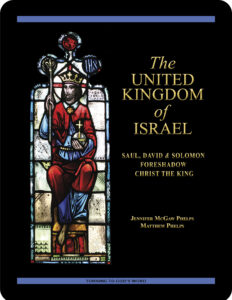 The United Kingdom of Israel:
The United Kingdom of Israel:
Saul, David & Solomon
Foreshadow Christ the King
Lesson 5 David Is Anointed by Samuel
the First Book of Samuel 16:1—17:58
Revised Standard Version Catholic Edition (RSVCE)*
New American Bible Revised Edition (NABRE)*
Catechism of the Catholic Church
ex libris (in our library)
glossary for The United Kingdom of Israel
cross references in The United Kingdom of Israel
next lesson: David & Jonathan: Two Best Friends
This material coordinates with Lesson 5 on pages 31–37 in The United Kingdom of Israel: Saul, David & Solomon Foreshadow Christ the King.
“When your days are fulfilled and you lie down with your fathers, I will raise up your offspring after you, who shall come forth from your body, and I will establish his kingdom. He shall build a house for my name, and I will establish the throne of his kingdom for ever.”—the Second Book of Samuel 7:12–13
welcome to our in-depth study of Saul, David & Solomon
We invite interested groups and individuals to check out the sample first lesson from this 28- lesson
lesson  Turning to God’s Word Catholic Bible study. These online study pages link to our free lesson videos, as well as to a glossary and cross references in the biblical text. Other study aids include maps, additional commentary, and prayers based on the primary Scripture in each lesson. The United Kingdom of Israel: Saul, David & Solomon Foreshadow Christ the King has been granted an imprimatur and may be purchased from our website shop. If you have a Bible-study question or comment, click on the “ask us your question” or “what do you think” button on any study page.
Turning to God’s Word Catholic Bible study. These online study pages link to our free lesson videos, as well as to a glossary and cross references in the biblical text. Other study aids include maps, additional commentary, and prayers based on the primary Scripture in each lesson. The United Kingdom of Israel: Saul, David & Solomon Foreshadow Christ the King has been granted an imprimatur and may be purchased from our website shop. If you have a Bible-study question or comment, click on the “ask us your question” or “what do you think” button on any study page.
open with prayer
It’s always wise to begin any Bible study with prayer, whether reading the Scriptures alone or meeting with others in a discussion study group. You can pray using your own words or use one of the opening prayers on our website. We especially like the following:
Lord Jesus, you promised to send your Holy Spirit
to teach us all things.
As we read and study your word today,
allow it to touch our hearts and change our lives. Amen.
let’s review—the First Book of Samuel 14:1—15:35
In Lesson 4 God Regrets Making Saul King, Saul’s son Jonathan, with only his armor-bearer to accompany him, stages a daring attack on the Philistines. The Philistine army is thrown into a panic, and Saul’s forces strike down many enemy troops. Saul forbids anyone to eat until evening. Unaware of his father’s oath, Jonathan tastes some honey. When Jonathan later learns about the oath, he criticizes his father’s decision. At the end of the day, the people are so hungry that they begin slaying animals and consuming them with the blood, an act strictly forbidden by religious law. Saul instructs the people to slaughter their animals on a large stone, which he then later designates as an altar to the LORD. When Saul attempts to inquire of God whether to pursue the Philistines, he receives no answer. In seeking out the reason, Saul learns that Jonathan inadvertently has disobeyed him. Saul determines that Jonathan must die, and Jonathan is willing to accept this fate. The people object, however, and ransom Jonathan. Samuel tells Saul that God wants him to destroy the Amalekites, but instead of destroying all of the people and animals, he spares their king and the best of the animals. The LORD repents of making Saul king. Samuel is upset, but he tells Saul that the LORD has rejected him as king. Saul makes excuses, but Samuel announces that “to obey is better than sacrifice, and to listen than the fat of rams.” Saul admits that he has sinned and asks Samuel to worship with him. At first Samuel refuses, but eventually he consents. Then Samuel has the Amalekite king Agag brought to him, and Samuel personally slays Agag. Samuel returns to his home in Ramah, and Saul returns to Gibe-ah.
map notes—the valley of Elah
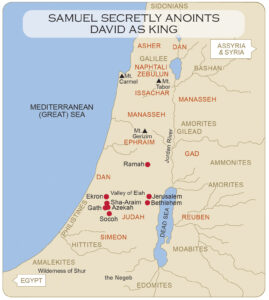 The Valley of Elah, the site of Saul’s encampment mentioned in the First Book of Samuel 17:2, is a wide swath of flat land located between territory allotted to the tribes of Judah and Benjamin and the cities occupied by the Philistines. In past confrontations with the Philistines, the descendants of Jacob didn’t have much difficulty chasing the Philistines out of the hill country. Now, however, it seems that the Philistine fighting force, equipped with chariots and iron weapons, is much better prepared to wage war. This new strength makes it difficult for Saul’s army to dislodge the Philistines from the plains. Click on the map (right) to enlarge it. The original map is on page 36 in The United Kingdom of Israel: Saul, David & Solomon Foreshadow Christ the King.
The Valley of Elah, the site of Saul’s encampment mentioned in the First Book of Samuel 17:2, is a wide swath of flat land located between territory allotted to the tribes of Judah and Benjamin and the cities occupied by the Philistines. In past confrontations with the Philistines, the descendants of Jacob didn’t have much difficulty chasing the Philistines out of the hill country. Now, however, it seems that the Philistine fighting force, equipped with chariots and iron weapons, is much better prepared to wage war. This new strength makes it difficult for Saul’s army to dislodge the Philistines from the plains. Click on the map (right) to enlarge it. The original map is on page 36 in The United Kingdom of Israel: Saul, David & Solomon Foreshadow Christ the King.
 Samuel & God arrange a ruse (27:08)
Samuel & God arrange a ruse (27:08)
In order to avoid putting Samuel’s life in danger, God advises Samuel to say that  he’s going to Bethlehem to offer sacrifice and not to mention anything about looking for a new king to anoint. In the video overview for this lesson, Turning to God’s Word author Matthew Phelps discusses the way in which Samuel’s behavior, although intended to deceive Saul, nevertheless doesn’t qualify as a lie. What do you think might lead God to condone such behavior? Have you ever felt that deception
he’s going to Bethlehem to offer sacrifice and not to mention anything about looking for a new king to anoint. In the video overview for this lesson, Turning to God’s Word author Matthew Phelps discusses the way in which Samuel’s behavior, although intended to deceive Saul, nevertheless doesn’t qualify as a lie. What do you think might lead God to condone such behavior? Have you ever felt that deception  might be justified in your own life? What were the circumstances, and how did you handle the situation? Would you handle a similar situation in that same way?
might be justified in your own life? What were the circumstances, and how did you handle the situation? Would you handle a similar situation in that same way?
The Scripture ranges for the videos that accompany this Catholic Bible study match the Scripture ranges for the sets of questions in The United Kingdom of Israel: Saul, David & Solomon Foreshadow Christ the King. You can follow along as Turning to God’s Word author Matthew Phelps discusses Lesson 5, “David Is Anointed by Samuel,” on pages 31–37 in the study book.
anointed—you could look it up in our archives
 The First Book of Samuel 16:13 describes David being anointed to replace Saul, whom the LORD rejected as king. David’s anointing takes place more or less in secret. Learn about the meaning of the word “anointed” and how David’s anointing prefigures Jesus as the Messiah. Lost in Translation is an online column in which Turning to God’s Word author Matthew Phelps helps readers connect with ideas expressed in the original languages of the Scriptures. New Lost in Translation entries are posted on Mondays, and past entries are archived on our website. Contact us if you’d like to receive Lost in Translation by email every week.
The First Book of Samuel 16:13 describes David being anointed to replace Saul, whom the LORD rejected as king. David’s anointing takes place more or less in secret. Learn about the meaning of the word “anointed” and how David’s anointing prefigures Jesus as the Messiah. Lost in Translation is an online column in which Turning to God’s Word author Matthew Phelps helps readers connect with ideas expressed in the original languages of the Scriptures. New Lost in Translation entries are posted on Mondays, and past entries are archived on our website. Contact us if you’d like to receive Lost in Translation by email every week.
WHAT DO YOU THINK about Samuel’s feelings?
Although Samuel is widely regarded as particularly blessed by being a priest, a judge of Israel, and the prophet chosen to anoint the first two kings of the united kingdom, his life nevertheless is filled with disappointment.
 ? Not only do Samuel’s own sons fail to walk in the path of righteousness, the first king anointed to rule over the descendants of Jacob also proves unworthy of the office. What do you think most disappoints Samuel about Saul’s failure to live up to expectations?
? Not only do Samuel’s own sons fail to walk in the path of righteousness, the first king anointed to rule over the descendants of Jacob also proves unworthy of the office. What do you think most disappoints Samuel about Saul’s failure to live up to expectations?
? Have you ever been disappointed in the results of some task undertaken out of love for God?
? What did you do to overcome your disappointment?
? Do you think that Samuel’s reaction to Saul being rejected by God fits into the category of a normal human response to disappointment?
? Consider whether God experiences disappointment when men and women fail to follow his commandments.
? What can present-day Christians learn from Samuel about coping with disappointment?
? Why might Samuel spreading the word that he’s going to Bethlehem to make a sacrifice to the LORD serves to protect the prophet from Saul’s wrath?
how many sons does Jesse have?
There’s an inconsistency between the number of Jesse’s sons recorded in the sixteenth chapter in the First Book of Samuel and the number listed in the First Book of the Chronicles 2:13–17. What might account for this discrepancy? Consider which number might be more significant in terms of salvation history.
biblical vocabulary—Ephrathite & Ephraimite
In the First Book of Samuel 17:12, David is described as the son of an Ephrathite. You can visit the online glossary to learn why some descendants of Judah living in the area of Bethlehem are called  Ephrathites. An Ephraimite, on the other hand, usually is a descendant of Ephraim, one of Joseph’s two sons born to an Egyptian mother. The word Ephraimite also may be used to describe a person living in territory allotted to the tribe of Ephraim. Occasionally Levites, who weren’t allotted land, are identified by the territory in which they settle. This is the case with Samuel’s family, who are Levites, but live in the territory of Ephraim. This is similar to someone of Spanish descent being identified as a Californian because of the state where they reside.
Ephrathites. An Ephraimite, on the other hand, usually is a descendant of Ephraim, one of Joseph’s two sons born to an Egyptian mother. The word Ephraimite also may be used to describe a person living in territory allotted to the tribe of Ephraim. Occasionally Levites, who weren’t allotted land, are identified by the territory in which they settle. This is the case with Samuel’s family, who are Levites, but live in the territory of Ephraim. This is similar to someone of Spanish descent being identified as a Californian because of the state where they reside.
complications arise with two anointed kings
Earlier in the First Book of Samuel 9:27—10:1, Samuel made a point of secretly anointing Saul as king. Now in the First Book of Samuel 16:13, Samuel anoints David in front of his brothers, but there’s little other evidence that the kingdom is passing to David. Saul, who’s been told that he’s going to lose the kingdom, still retains political power. David is recognized by God as king long before most people witness this. It’s significant that almost as soon as the Spirit of the LORD comes mightily upon David, it also departs from Saul. In God’s eyes there apparently can be only one anointed king at a time.
WHAT DO YOU THINK about how many kings there are now?
In the First Book of Samuel 13:1, confusion over the length of Saul’s reign hinted at bigger difficulties to come than missing chronology. For a time there are two anointed earthly kings designated to rule over the descendants of Jacob. This presents serious questions that echo the questions raised by the people’s desire to be ruled by an earthly king instead of a heavenly one.
 ? Is Saul or David the rightful king?
? Is Saul or David the rightful king?
? Does allegiance to an earthly king take precedence over the people’s allegiance to their heavenly king?
? How do the people determine which king they should follow?
? Are earthly kings required to submit to the authority of the heavenly king?
? What responsibility do present-day Christians have to show allegiance to secular political rulers?
? How do you as a Christian show allegiance to Christ the King?
pray with the Psalms—David prefigures Jesus as the Good Shepherd
Psalm 78:70–72, at the end of a long list of events in the history of the descendants of Jacob,  recognizes David as the man chosen to rule the people God claims as his own possession: “He [God] chose David his servant, and took him from the sheepfolds; from tending the ewes that had young he brought him to be the shepherd of Jacob his people, of Israel his inheritance. With upright heart he tended them, and guided them with skilful hand.” The same words that are applied to David in Psalm 78 also can be applied to Jesus. Prayed at Thursday Vigils (Week II) Psalm 78 will be included as part of Lesson 23 Hidden Lessons of the Past
recognizes David as the man chosen to rule the people God claims as his own possession: “He [God] chose David his servant, and took him from the sheepfolds; from tending the ewes that had young he brought him to be the shepherd of Jacob his people, of Israel his inheritance. With upright heart he tended them, and guided them with skilful hand.” The same words that are applied to David in Psalm 78 also can be applied to Jesus. Prayed at Thursday Vigils (Week II) Psalm 78 will be included as part of Lesson 23 Hidden Lessons of the Past in the Turning to God’s Word Catholic Bible study Sing a New Psalm: Communicating with God Through the Prayers of the Church—Volume II: Vigils, Day Prayer & Compline, which is scheduled for publication in late summer of 2025.
in the Turning to God’s Word Catholic Bible study Sing a New Psalm: Communicating with God Through the Prayers of the Church—Volume II: Vigils, Day Prayer & Compline, which is scheduled for publication in late summer of 2025.
gaining strength from David’s experience
Saint John Henry Newman (1801–1890) was an Anglican who later became a Catholic cardinal. He taught that David’s battle with Goliath could be viewed by Christians as an example of the way in which to fight wicked behavior in the world:
“When Satan comes against you, do not fear or waver. Pray to God, and he will help you.” Newman encouraged Christians to bolster their courage when facing evil by repeating David’s words to the Philistine recorded in the First Book of Samuel 17:45: “You come to me with a sword and with a spear and with a javelin; but I come to you in the name of the LORD of hosts, the God of the armies of Israel, whom you have defiled.”
pray with the Psalms—David trusts in the LORD
Psalm 27, attributed to David, is a prayer of confidence in the LORD’s protection in the face of all  adversity. The First Book of Samuel 17:1–54 records David’s well-known encounter with Goliath as the first of a number of dangerous foes David will face during his life. Psalm 27 provides insight into the source of David’s strength. His trust that the LORD won’t abandon him leads him to promise that after God delivers him from his enemies, he will offer a sacrifice of joy by singing and making music to the LORD. In Psalm 27:13, David expresses complete faith when he prays: “I believe that I shall see the goodness of the LORD in the land of the living!” Prayed at Tuesday Vespers (Week I), Psalm 27 is included as part of Lesson 7 One Thing I Ask of the LORD
adversity. The First Book of Samuel 17:1–54 records David’s well-known encounter with Goliath as the first of a number of dangerous foes David will face during his life. Psalm 27 provides insight into the source of David’s strength. His trust that the LORD won’t abandon him leads him to promise that after God delivers him from his enemies, he will offer a sacrifice of joy by singing and making music to the LORD. In Psalm 27:13, David expresses complete faith when he prays: “I believe that I shall see the goodness of the LORD in the land of the living!” Prayed at Tuesday Vespers (Week I), Psalm 27 is included as part of Lesson 7 One Thing I Ask of the LORD  in the Turning to God’s Word Catholic Bible study Sing a New Psalm: Communicating with God Through the Prayers of the Church—Volume I: Lauds & Vespers.
in the Turning to God’s Word Catholic Bible study Sing a New Psalm: Communicating with God Through the Prayers of the Church—Volume I: Lauds & Vespers.
biblical vocabulary—greaves
The warrior Goliath described in the seventeenth chapter in the First Book of Samuel has become a symbol representing powerful institutional forces acting against the underprivileged. The First Book of Samuel 17:6 records that Goliath’s armor included greaves of bronze, which were protective metal stockings that basically served as shin guards. The rest of Goliath’s armor also is bronze, but his sword is made of iron, evidence of a shift occurring as history moves from the Bronze Age to the Iron Age.
a look at David’s noble qualities
In the seventeenth chapter in the First Book of Samuel, David rejects the armor of Saul to rely on the LORD to bring him victory in his battle with Goliath. David’s bravery is an indication of his holiness. The word courage is related to the word for heart, and courage or fortitude is one of the seven gifts of the Holy Spirit. (The others are fear of the LORD, knowledge, counsel, understanding, wisdom, and piety.) Most Christians understand that courage is directly opposed to cowardice, but the role that courage plays in the spiritual life is easily overlooked. In the book of Revelation 21:7–8, the one sitting on the throne of heaven announces that there will be no room in the new Jerusalem for the cowardly. The lot of those who lack courage instead is with the faithless, the polluted, murderers, fornicators, sorcerers, idolators, and liars—all of whom are to be consigned to the the lake of  fire. Learn more about the apocalyptic final book of the New Testament in Lesson 22 I Saw a New Heaven & a New Earth in the Turning to God’s Word Catholic Bible study The Revelation of Jesus Christ: The Faithful Witness.
fire. Learn more about the apocalyptic final book of the New Testament in Lesson 22 I Saw a New Heaven & a New Earth in the Turning to God’s Word Catholic Bible study The Revelation of Jesus Christ: The Faithful Witness.
chronology questions
There are a number of discrepancies in the timing of events recorded in the First and Second Books of Samuel. David’s actions and whereabouts in the sixteenth and seventeenth chapters in the First Book of Samuel are especially confusing. David is described as a musician in Saul’s household, and also as Saul’s armor-bearer, but a few verses later Saul appears to have no idea who David is. Scholars believe that the First and Second Books of Samuel were compiled from multiple sources, and this could explain the repetition as well as the discrepancies. Learn more in “A Confusing Time Line,” the commentary on page 35 of The United Kingdom of Israel: Saul, David & Solomon Foreshadow Christ the King.
Q&A—a man after God’s own heart
A participant questions this sentence in “A Key Way That David & Saul Differ” on page 37 in The United Kingdom of Israel: Saul, David & Solomon Foreshadow Christ the King: “The First Book of Samuel 13:14 points out a key difference between Saul and David—David is chosen by the LORD for the very reason that he already possesses a heart like God’s own.” In the New Testament, the Acts of the Apostles 13:21–22 records that Paul, when preaching in Antioch, quotes the passage from the First Book of Samuel. Our participant’s question calls attention to a common stumbling block encountered when we make a serious effort to read and understand Scripture on our own. It’s worth spending a little time unraveling what’s going on.
 Q: Isn’t referring to David having a heart like God’s own the same thing as saying David’s heart is the same as God’s? I find this interpretation offensive. Only Jesus has a heart like God’s. The Scripture specifically describes David as “a man after [God’s] own heart.”
Q: Isn’t referring to David having a heart like God’s own the same thing as saying David’s heart is the same as God’s? I find this interpretation offensive. Only Jesus has a heart like God’s. The Scripture specifically describes David as “a man after [God’s] own heart.”
A: We have no problem agreeing that David’s heart isn’t identical to God’s heart, but that isn’t what we’re stating when we write that David’s heart is like God’s heart. Failing to agree on the meaning of words and phrases in the Bible can lead to serious misunderstandings related to our faith. The sentence in the commentary for this lesson is one of four places in the written study where we refer to David’s heart as being like God’s own. It’s based on the First Book of Samuel 13:14, which records Samuel telling Saul: “But now your kingdom shall not continue; the LORD has sought out a man after his own heart …” (RSVCE).
Publishing Bible studies is a daunting task. Written commentary can have a long shelf life, so it’s important that it not be wrong or misleading. It’s for this reason that all Turning to God’s Word Catholic Bible studies are submitted for an imprimatur and nihil obstat before they’re printed. Both the Bishop and the Censor Librorum for the Diocese of Des Moines have read The United Kingdom of Israel: Saul, David & Solomon Foreshadow Christ the King and found it to be free of doctrinal or moral error. This means that they’ve found nothing objectionable in our repeated statement that David has a heart like God’s own. Had we actually been suggesting that David was equal to God, we’re reasonably certain our study wouldn’t have passed muster, since such a statement clearly would be in error. In addition, such a statement would contradict any number of other statements in Scripture, in Church tradition, and in this Catholic Bible study, directly flying in the face of the reason why David is understood to be such an important Old Testament type of Christ the King.
language changes over time & idioms
In addition to the problems faced in dealing with simply translating the Bible into English, Scripture scholars also must attempt to make sense of Greek and Hebrew language commonly used thousands of years ago. In that amount of time, all languages undergo significant changes. Recordings of the Our Father (the Lord’s Prayer) in Old English commonly spoken in the 11th century prove the point. Although English will be the first language for most people reading our website, Old English is almost unrecognizable as the same language we speak today—and we’re only looking at language changes that occurred in English over a period of about a thousand years. The reigns of Saul and David occurred 3,000 years ago, and the First and Second Books of Samuel were written in the form of Hebrew that was in common usage at that time but isn’t in regular use today.
Idioms in Scripture—phrases or expressions with an accepted meaning that doesn’t always make sense literally—further complicate matters. As an example of a common present-day idiom, when we say something “costs an arm and a leg” we mean that it’s expensive. Everyone who hears that expression understands its meaning. No one actually expects to amputate any limbs in order to purchase the item being described.
Etymologists agree that the idiom “after his or her heart” derives from the First Book of Samuel 13:14. This idiom is used to make a comparison but never to describe two things that literally are identical. Stating that someone is “after a person’s own heart” in English is a way of describing someone as similar to the first person. The most common definition of similar is “alike.” If two things are similar, they’re alike in some way. No two people—even identical twins—ever are exactly alike, but it’s possible for two different people to share certain traits. If David is a man after God’s own heart, David is in some way like God. Church Fathers traditionally have taught that David desires many of the same things that God desires. Desires originate in the heart, and so we understand that David’s heart resembles God’s own heart. This is crucial information when we’re looking at David’s kingship as a foreshadowing of the reign of Christ the King, which all Church Fathers agree that it does.
what Matthew says: what’s behind this translation
Christian tradition and the Church Fathers’ interpretation is based on information well above the pay grade of most people reading the Bible today. Turning to God’s Word author Matthew Phelps explains that the First Book of Samuel originally  was written in ancient Hebrew, but many English translations are based on the Greek version of the Old Testament known as the Septuagint. Because there’s no clear Greek preposition that exactly means “like,” when rendering the First Book of Samuel 13:14 from Hebrew to Greek, the translators used a Greek word that somewhat approximates the meaning of “like.” The same Greek word appears in the New Testament titles of the Gospels, where it’s translated into English as “according to” (the Gospel According to Matthew, etc.). Eventually, based on the Septuagint, the phrase in the First Book of Samuel 13:14 appeared in many English translations as “a man after [God’s] own heart.”
was written in ancient Hebrew, but many English translations are based on the Greek version of the Old Testament known as the Septuagint. Because there’s no clear Greek preposition that exactly means “like,” when rendering the First Book of Samuel 13:14 from Hebrew to Greek, the translators used a Greek word that somewhat approximates the meaning of “like.” The same Greek word appears in the New Testament titles of the Gospels, where it’s translated into English as “according to” (the Gospel According to Matthew, etc.). Eventually, based on the Septuagint, the phrase in the First Book of Samuel 13:14 appeared in many English translations as “a man after [God’s] own heart.”
The Vulgate, translated by St. Jerome in the 4th century and based on both Greek and Hebrew sources (many no longer available to scholars), became the standard Latin Bible used for centuries by the Roman Catholic Church. It’s significant that St. Jerome used Latin words that are more closely aligned with the original Hebrew idea of God seeking a man with a heart like his own. We can see this reflected in the way that the First Book of Samuel 13:14 later was translated from the Latin Vulgate into English for the Douay-Rheims Bible: “The Lord hath sought him a man according to his own heart.”
proper English usage also comes into play
Our questioner may be confused about the correct English usage of the word “like.” As we  move forward, the First and Second Books of Samuel will make it abundantly clear that every single one of David’s desires aren’t perfectly aligned with God’s desires. David usually desires what God desires. He’s interested in righteousness and in behaving righteously—most of the time. In this way his heart resembles God’s heart, but it most assuredly isn’t identical to it. When used as a noun, the word “like” does indeed mean “equal” (for example, “we’ll never see his like again”). Used as a preposition, however, “like” completely loses the idea of two things being the very same and instead is used to describe things that are “similar to” or “much the same.” When careful writers wish to convey in English that two things are identical or equal, they use the word “identical” or “equal,” not “like” or “after.” You can learn more by reading a man after God’s own heart in Lost in Translation, an online column in which Turning to God’s Word author Matthew Phelps helps readers connect with ideas expressed in the original languages of the Scriptures.
move forward, the First and Second Books of Samuel will make it abundantly clear that every single one of David’s desires aren’t perfectly aligned with God’s desires. David usually desires what God desires. He’s interested in righteousness and in behaving righteously—most of the time. In this way his heart resembles God’s heart, but it most assuredly isn’t identical to it. When used as a noun, the word “like” does indeed mean “equal” (for example, “we’ll never see his like again”). Used as a preposition, however, “like” completely loses the idea of two things being the very same and instead is used to describe things that are “similar to” or “much the same.” When careful writers wish to convey in English that two things are identical or equal, they use the word “identical” or “equal,” not “like” or “after.” You can learn more by reading a man after God’s own heart in Lost in Translation, an online column in which Turning to God’s Word author Matthew Phelps helps readers connect with ideas expressed in the original languages of the Scriptures.
Interpreting the First Book of Samuel 13:14 to mean that David’s heart is like God’s heart uses a figure of speech known as a simile. A simile is related to a metaphor, but it uses the word “like” to compare two different things. A person who insists on clinging to an idea might be described as being “like a dog with a bone.” This figure of speech doesn’t mean that the person is a dog or is clutching an actual bone. It merely means that the person is being persistent about holding onto his or her idea. One might read into the simile that the person who is like a dog with a bone is stubborn, determined, tenacious, steadfast, obstinate, rigid, resolute, intractable, or any number of other disparate adjectives—but the simile itself doesn’t suggest anything other than persistence. Although this particular simile most often is used to convey such persistence in a pejorative light, it also can be used to describe admirable behavior. At Turning to God’s Word, we steadfastly insist that our study doesn’t in any way suggest equality between David and God. As far as this issue goes, we indeed are like a dog with a bone.
what if you’re still having trouble?
We take sincere questions and concerns about content extremely seriously, and we spend a great deal of time researching our responses. If we agree that a correction or clarification is needed, we’ll immediately post that information on the relevant online study pages and amend our files to include the updated information in subsequent printings. If we don’t agree, we’ll post our reasons why not, as we’ve done here, but not without first attempting to find out what’s behind the original question or concern. In this case, we totally agree that David isn’t identical to God. We just don’t agree that when we wrote that David has a heart like God’s own we were stating that David is God’s equal. We’re convinced that Hebrew etymology, standard English usage, and Church teaching all support our position.
Serious Scripture study can open the door to a number of problems, many much more difficult to address than this one. What the biblical text actually says frequently flies in the face of what we think we already know about God. When that happens, the best thing to do is ask the Holy Spirit for understanding, keeping in mind that understanding may not occur instantaneously. It can take time for us to open our minds and hearts to what God is saying in Scripture. When possible, we try to table our concerns and move on. Often a confusing passage becomes clearer as we learn more about it in context.
If you find it’s not possible to set aside your concerns, there are alternatives. You can join or start a different Catholic Bible study that’s more in keeping with your own ideas, or you can consider abandoning Bible study for the time being in favor of improving your relationship with God through one of two other effective methods—1) increased dedication to regular prayer or 2) more focused participation in the Church’s liturgy. Bible study, prayer, and liturgy all have the same end goal—to foster a more intimate relationship with Jesus Christ.
ex libris—two books about spiritual direction
Two of the best books we’ve recently come across that discuss the practical ins and outs of 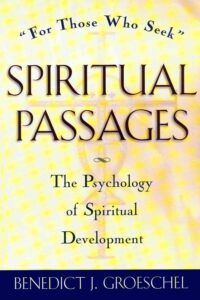
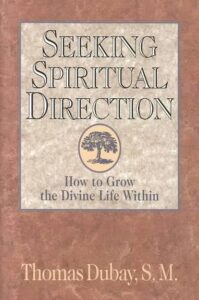 discernment are Spiritual Passages by Benedict Groeschel, C.F.R., and Seeking Spiritual Direction by Thomas Dubay, S.M.
discernment are Spiritual Passages by Benedict Groeschel, C.F.R., and Seeking Spiritual Direction by Thomas Dubay, S.M.  Both authors have written other excellent books as well, but people interested in learning more about spiritual direction may find these two titles particularly insightful. At ex libris—main bookshelf, you can read excerpts from both of these books by Catholic priests, and you also can learn more about other works related to Catholic Bible study.
Both authors have written other excellent books as well, but people interested in learning more about spiritual direction may find these two titles particularly insightful. At ex libris—main bookshelf, you can read excerpts from both of these books by Catholic priests, and you also can learn more about other works related to Catholic Bible study.
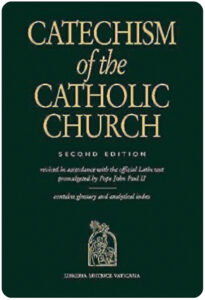 the best Catholic commentary about Scripture
the best Catholic commentary about Scripture
To find out more about how Church teaching is supported by Scripture passages in The United Kingdom of Israel: Saul, David & Solomon Foreshadow Christ the King, check out the Index of Citations in the Catechism of the Catholic Church. Links (Revised Standard Version Catholic Edition [RSVCE*]) to the primary Scripture passages in the lesson and relevant paragraphs in the Catechism are provided here. Not every passage in the biblical text for this Catholic study is referenced in a Catechism paragraph, however.
the First Book of Samuel 16:1—paragraph 436
the First Book of Samuel 16:12–13—paragraph 436
the First Book of Samuel 16:13—paragraph 695
ways our glossary might prove helpful
In addition to providing extra information about geographical locations, our glossary also points out  persons and places mentioned in the biblical text under multiple names or spellings. If you can remember a name but aren’t sure in which lesson it shows up, you can find it in the glossary, which lists every proper noun that appears in the primary biblical text for The United Kingdom of Israel: Saul, David & Solomon Foreshadow Christ the King.
persons and places mentioned in the biblical text under multiple names or spellings. If you can remember a name but aren’t sure in which lesson it shows up, you can find it in the glossary, which lists every proper noun that appears in the primary biblical text for The United Kingdom of Israel: Saul, David & Solomon Foreshadow Christ the King.
to learn more, read more Scripture
If you’re having difficulty with a particular passage of Scripture, it can be helpful to read the relevant  cross references—but looking these up can take time. To make that easier, we’ve compiled the cross references from the Revised Standard Version Second Catholic Edition (RSV2CE)—the translation that we reprint in our study books. That list can be found at the top of every online study page, and it includes links to cross references in the primary biblical text for The United Kingdom of Israel: Saul, David & Solomon Foreshadow Christ the King.
cross references—but looking these up can take time. To make that easier, we’ve compiled the cross references from the Revised Standard Version Second Catholic Edition (RSV2CE)—the translation that we reprint in our study books. That list can be found at the top of every online study page, and it includes links to cross references in the primary biblical text for The United Kingdom of Israel: Saul, David & Solomon Foreshadow Christ the King.
don’t forget about our indexes & extra online material

 If you’re trying to locate information about a specific Scripture passage, you can look it up in the index at the back of the study book or sample lesson. If you want to find a particular commentary, you can look up its title in the topics index. To learn more about another book of the Bible for which there’s a Turning to God’s Word study, visit the online study directories to read the commentaries and watch any accompanying videos. Finally, if you have a question or would like to make a comment about any of our studies, you can use one of the “ask us your question” or “what do you think” buttons to email our authors.
If you’re trying to locate information about a specific Scripture passage, you can look it up in the index at the back of the study book or sample lesson. If you want to find a particular commentary, you can look up its title in the topics index. To learn more about another book of the Bible for which there’s a Turning to God’s Word study, visit the online study directories to read the commentaries and watch any accompanying videos. Finally, if you have a question or would like to make a comment about any of our studies, you can use one of the “ask us your question” or “what do you think” buttons to email our authors.
ex libris—Church documents & books about religious topics
Link to magisterial documents referred to in our Bible studies at ex libris—magisterial documents.  This listing includes significant recent encyclicals as well as a number of historical Church documents. Recommended books related to Scripture study can be found at ex libris—main bookshelf.
This listing includes significant recent encyclicals as well as a number of historical Church documents. Recommended books related to Scripture study can be found at ex libris—main bookshelf.
wondering how to pronounce some of these words?
The following link is to a reading from the New International Version (NIV) Bible. To listen, click on the audio icon above the printed text. Although not taken from the translations used in our study materials, the NIV reading provides an audio guide to pronunciation of words in this lesson’s primary biblical text. A close online version of the translation of the Bible used in Catholic liturgy in the United States as well as an audio guide for daily Mass readings for the current month can be found on the website of the United States Conference of Catholic Bishops (USCCB).
the First Book of Samuel 16:1—17:58 (NIV)
 close with Bible-based prayer related to this lesson
close with Bible-based prayer related to this lesson
Many of our Catholic study groups like to conclude their discussions with a prayer based on the scriptural focus of their lesson, and some participants include Scripture-specific prayer in their individual study. If you’re uncomfortable composing your own Bible-based prayers you can follow our four easy steps. If you prefer, you can use the following prayer based on the biblical text in this lesson in the study book The United Kingdom of Israel: Saul, David & Solomon Foreshadow Christ the King.
O God, you teach us to honor your reign
that extends over all time and space.
Help us to look beyond what’s readily apparent
and see to the heart of the things that matter.
Give us courage to fight against
enemies that appear far stronger than we are.
We ask this in the name of your Son, Jesus,
who overcame death by dying, and so opened the possibility
of eternal life to all men and women. Amen.
Lesson 6 David & Jonathan: Two Best Friends—the First Book of Samuel 18:1—19:24
Lesson 4 God Regrets Making Saul King—the First Book of Samuel 14:1—15:35
you also may like our two-part study of the prophets
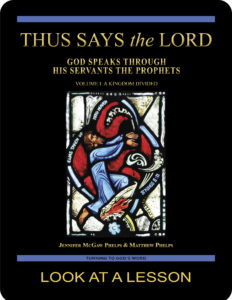
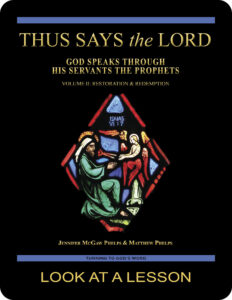 Thus Says the LORD: God Speaks Through His Servants the Prophets—Volume I: A Kingdom Divided examines the prophets in their historical context using the First and Second Books of the Kings and other Old Testament passages written before the Babylonian Exile in 586 B.C. Volume II: Restoration & Redemption looks at the post-exilic prophets. This 51-lesson Catholic Bible study builds on The United Kingdom of Israel: Saul, David & Solomon Foreshadow Christ the King. Click on the books’ covers to view a sample lesson from each volume.
Thus Says the LORD: God Speaks Through His Servants the Prophets—Volume I: A Kingdom Divided examines the prophets in their historical context using the First and Second Books of the Kings and other Old Testament passages written before the Babylonian Exile in 586 B.C. Volume II: Restoration & Redemption looks at the post-exilic prophets. This 51-lesson Catholic Bible study builds on The United Kingdom of Israel: Saul, David & Solomon Foreshadow Christ the King. Click on the books’ covers to view a sample lesson from each volume.
start a Turning to God’s Word Bible study
 Thank you for your interest in The United Kingdom of Israel: Saul, David & Solomon Foreshadow Christ the King.
Thank you for your interest in The United Kingdom of Israel: Saul, David & Solomon Foreshadow Christ the King.  Information about beginning a Turning to God’s Word Bible study can be found at start a Bible study. Tami, Matthew, and I are available to answer questions. Contact us if you’d like to start one of our studies or have your schedule listed with other TtGW study groups on our website. —Jennifer
Information about beginning a Turning to God’s Word Bible study can be found at start a Bible study. Tami, Matthew, and I are available to answer questions. Contact us if you’d like to start one of our studies or have your schedule listed with other TtGW study groups on our website. —Jennifer
*There are seven deuterocanonical books in the Old Testament—the Books of Tobit, Judith, Wisdom, Sirach, Baruch, and First and Second Maccabees, as well as some passages in the Books of Esther and Daniel. Protestants usually refer to these works as “apocryphal,” a word that means “outside the (Protestant) canon” because they’re excluded from most Protestant Bibles. The word “deuterocanonical” means “second canon”; Catholics use that word to refer to any section of the Catholic Old Testament for which there are no extant, or existing, Hebrew manuscripts. All of the deuterocanonical books appear in the Septuagint, the earliest remaining versions of which date to the 1st century B.C. This Greek translation of the Old Testament was in common use by Jews at the time of Jesus—but the same books aren’t found in existing Hebrew manuscripts, which aren’t as old as the oldest version of the Septuagint. Learn more by reading How Do Catholic & Protestant Bibles Differ?
Turning to God’s Word printed Bible studies use the 2006 Revised Standard Version Second Catholic Edition (RSV2CE) translation for all Scripture references except those to the Psalms, which are taken from The Abbey Psalms and Canticles, prepared by the Benedictine monks of Conception Abbey and published in 2020 by the United States Conference of Catholic Bishops (USCCB). All Scripture links for the online study pages for The United Kingdom of Israel: Saul, David & Solomon Foreshadow Christ the King are to the 1966 Revised Standard Version Catholic Edition (RSVCE) translation. The New International Version (NIV) audio recordings follow the same chapter and verse numbering as the RSV Catholic translations, but the NIV translation doesn’t include the deuterocanonical books and passages.
The 1966 RSVCE uses archaic pronouns and verb forms such as “thee,” “thou,” “didst” in the Psalms and in direct quotations attributed to God. The 2006 RSV2CE replaces those with more accessible English. The few significant translation changes in the RSV2CE include rendering almah as “virgin” in the Book of Isaiah 7:14 and restoring the term “begotten” in the Gospel According to John 3:16.
Numbering varies for some passages in this Bible study. Turning to God’s Word studies (print and digital) follow the numbering in the Revised Standard Version Catholic translations (RSV2CE and RSVCE). Discrepancies in the New American Bible Revised Edition (NABRE) are noted in the Index of Scripture Citations in the study book and the online sample.
 You can learn more about the Psalms by viewing a sample lesson from the Turning to God’s Word Catholic Bible study Sing a New Psalm: Communicating with God Through the Prayers of the Church—Volume I: Lauds & Vespers. The second part of that study, Sing a New Psalm: Communicating with God Through the Prayers of the Church—Volume II: Vigils, Day Prayer & Compline, is scheduled for publication in 2025. Some verse numbers may vary in different translations of the Psalms.
You can learn more about the Psalms by viewing a sample lesson from the Turning to God’s Word Catholic Bible study Sing a New Psalm: Communicating with God Through the Prayers of the Church—Volume I: Lauds & Vespers. The second part of that study, Sing a New Psalm: Communicating with God Through the Prayers of the Church—Volume II: Vigils, Day Prayer & Compline, is scheduled for publication in 2025. Some verse numbers may vary in different translations of the Psalms.
